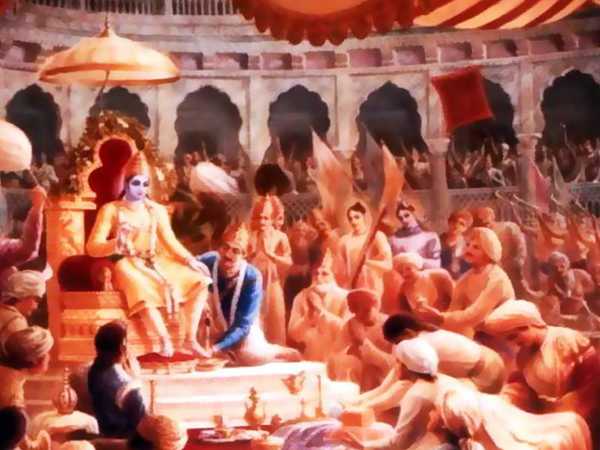Chapter 19

“Vaisampayana said. ‘Following the advice of Vidura, the king took up hisabode on the banks of the Bhagirathi which were sacred and deserved to bepeopled with the righteous. There many Brahmanas who had taken up theirabode in the woods, as also many Kshatriyas and Vaisyas and Sudras, cameto see the old monarch. Sitting in their midst, he gladdened them all byhis words. Having duly worshipped the Brahmanas with their disciples, hedismissed them all. As evening came, the king, and Gandhari of greatfame, both descended into the stream of the Bhagirathi and duly performedtheir ablutions for purifying themselves. The king and the queen, andVidura and others, O Bharata, having bathed in the sacred stream,performed the usual rites of religion. After the king had purifiedhimself by a bath, the daughter of Kuntibhoja gently led both him, whowas to her as her father-in-law and Gandhari from the water into the drybank. The Yajakas had made a sacrificial altar there for the king.Devoted to truth, the latter poured libations then on the fire. From thebanks of the Bhagirathi the old king, with his followers, observant ofvows and with senses restrained, then proceeded to Kurukshetra. Possessedof great intelligence, the king arrived at the retreat of the royal sageSatayupa of great wisdom and had an interview with him. Satayupa, Oscorcher of foes, had been the great king of the Kekayas. Having madeover the sovereignty of his kingdom to his son he had come into thewoods. Satayupa, received king Dhritarashtra with due rites. Accompaniedby him, the latter proceeded to the retreat of Vyasa. Arrived at Vyasa’sretreat, the delighter of the Kurus received his initiation into theforest mode of life. Returning he took up his abode in the retreat ofSatayupa. The high-souled Satayupa, instructed Dhritarashtra in all therites of the forest mode, at the command of Vyasa. In this way thehigh-souled Dhritarashtra set himself to the practice of penances, andall his followers also to the same course of conduct. Queen Gandharialso, O monarch, along with Kunti, assumed barks of trees and deer-skinsfor her robe, and set herself to the observance of the same vows as herlord. Restraining their senses in thought, words, and deeds, as well asby eye, they began to practise severe austerities. Divested of allstupefaction of mind, king Dhritarashtra began to practise vows andpenances like a great Rishi, reducing his body to skin and bones, for hisflesh was all dried up, bearing matted locks on head, and his person cladin barks and skins. Vidura, conversant with the true interpretations ofrighteousness, and endued with great intelligence, as also Sanjaya,waited upon the old king with his wife. Both of them with souls undersubjection, Vidura and Sanjaya also reduced themselves, and wore barksand rags.”‘




